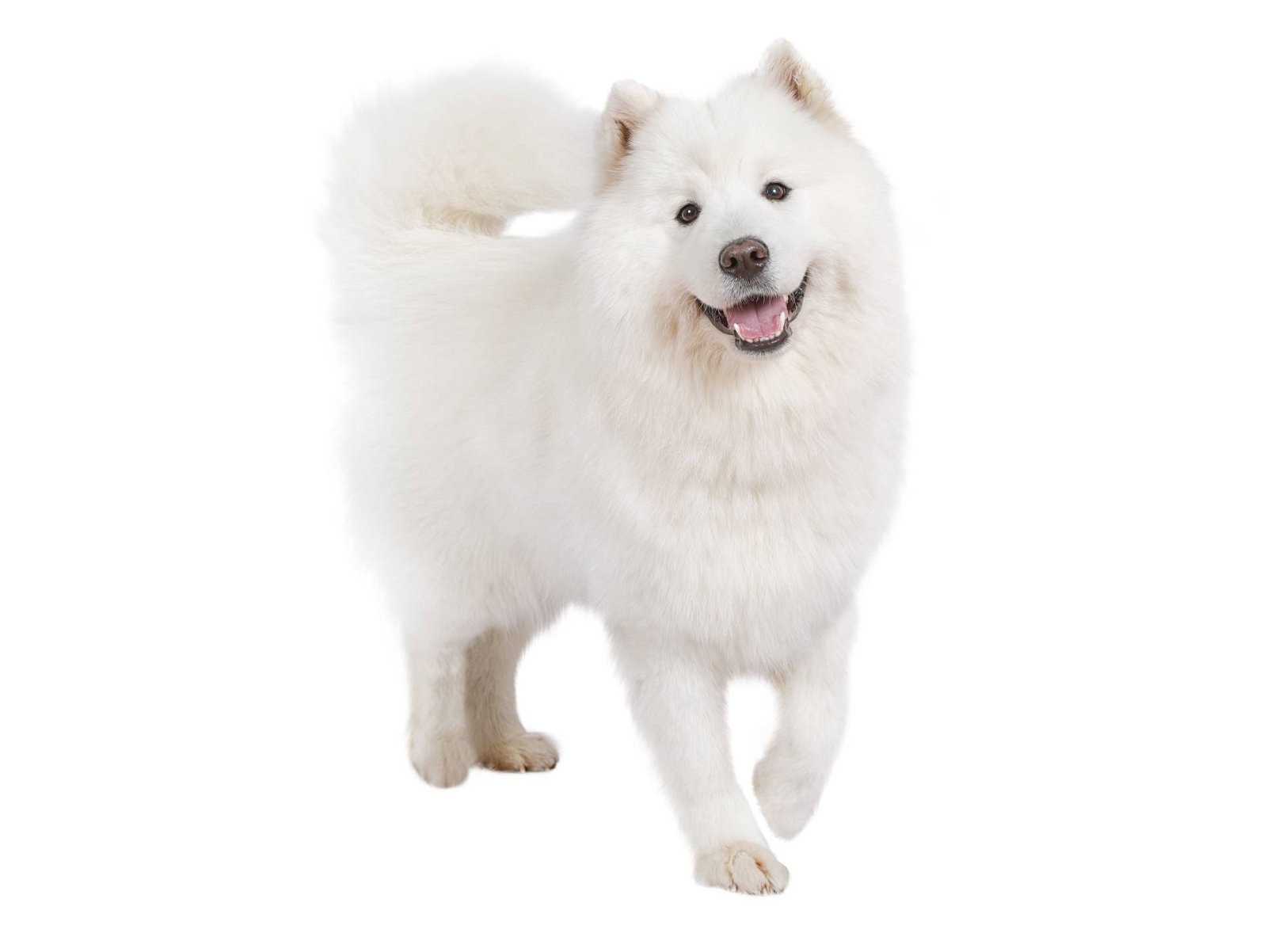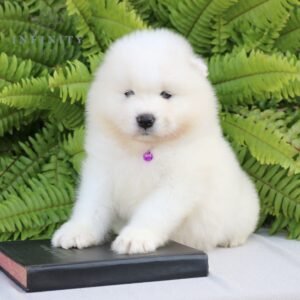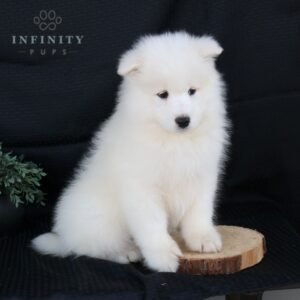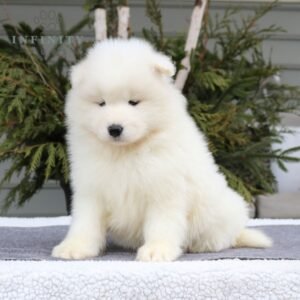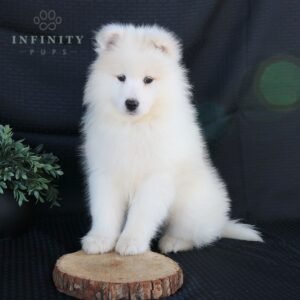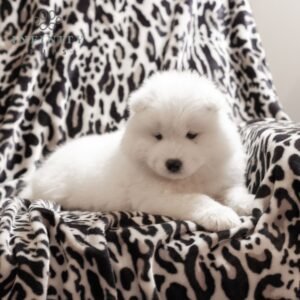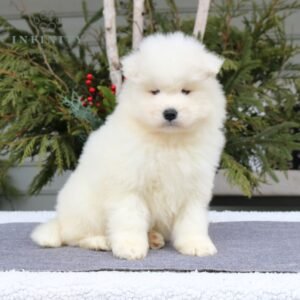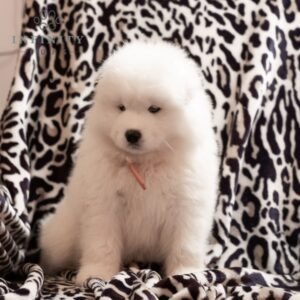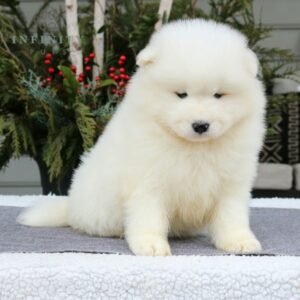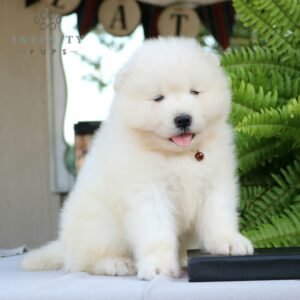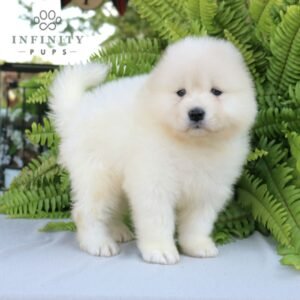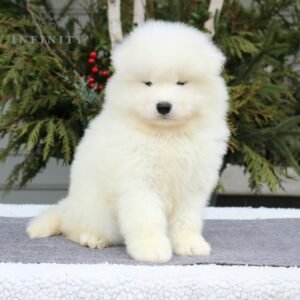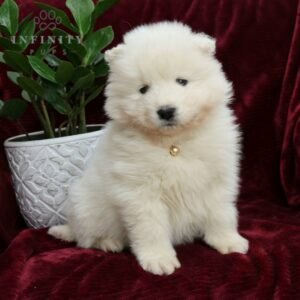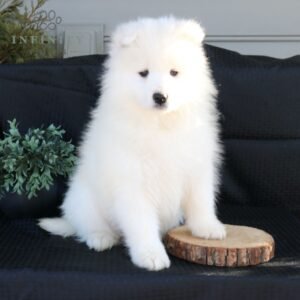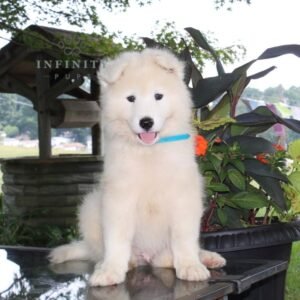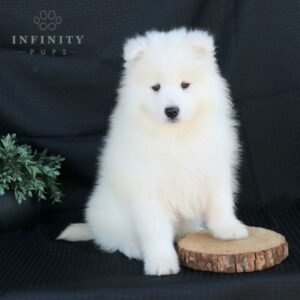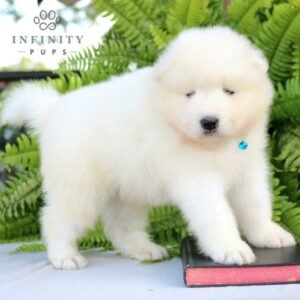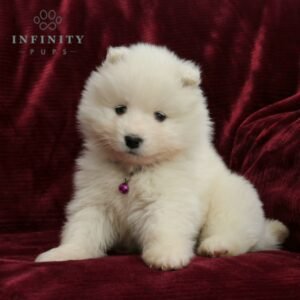Sorry, no puppies of this breed are currently available. Contact us to be notified when more are listed for adoption.
Have a question about our Samoyed puppies?
"*" indicates required fields
overview of the Samoyed Dog Breed
Are you looking for a dog that has a beautiful white coat, is gentle and loyal to your family, and is not afraid to work hard and be active?
If this is what you want in your next dog, then browse our available Samoyed puppies for sale below!
The Samoyed breed, also called the “Smiling Sammies” because of the upturned corners of their mouths, is a cheerful breed that is not afraid to work hard in harsh climates. With their gentle attitude, high intelligence, and family loyalty, the Samoyed is an excellent addition to any family.
If your family is ready for the newest beautiful addition to your family, then purchase your Samoyed puppy today, or browse our other puppies for sale!
Samoyed temperament
Adaptable: The Samoyed can adapt to a variety of homes, weather, and temperatures. While they do tend to bark more than some breeds, they can be trained to be patient and wait if things are not ideal for them.
Friendly: Samoyeds love interacting and being with people. While they are alert and will sense a stranger, they are not afraid to interact with the stranger and be friendly with them.
Gentle: The Samoyed breed does well with being kind to humans, particularly children. While they are a physically strong breed, they won’t usually run over humans and will quickly form a strong human bond.
Active: The Samoyed doesn’t like sitting still too long, and they are always looking for something to do. Make sure you give your Samoyed plenty of activity and exercise, or he will start coming up with his own version of fun which can result in destructive behavior.
Powerful: Samoyeds were bred to work hard in harsh climates, and this carries on with the breed today. Many of them can pull 1.5 times their weight on a sled. They are not afraid to work hard and long; in fact, they usually welcome this!
Vocal and Expressive: Samoyeds are known for their vocalizations, including barking, howling, and “talking.” They often use their voice to communicate with their owners and to express themselves.
Intelligent: Samoyeds are intelligent dogs and are capable of learning a variety of commands and tricks. However, they can also have an independent streak, so training should be consistent and patient.
Samoyed puppies grow up to be affectionate and charming dogs. Due to their social nature and grooming needs, they are best suited for families or individuals who can provide them with the attention, exercise, and care they require.
Samoyed Breed history
The Samoyed breed gets its name from the Samoyede people, a tribe of semi-nomadic people who live in Asia and Siberia. Wanting a dog that could resist cold temperatures and work hard, the tribe bred dogs for work in cold regions.
It is thought they were used for hunting reindeer and other animals at one time, but this changed over time. The Samoyed dogs were eventually used to pull sleds on the snow and watch over flocks and herds of animals.
When European adventurers made voyages to the Arctic regions in the 18th century, they discovered the breed and began bringing them back to England. The breed gained popularity because of its beautiful white coat, as well as its ability to pull sleds in cold temperatures.
Europeans eventually began using Samoyed to pull sleds in the snow on other Arctic explorations, including Scott, Shackleton, and Amundsen.
In 1906, the first Samoyed was registered by the American Kennel Club.
A few breeds similar to Samoyeds include Siberian Huskies, Alaskan Malamutes, and Pomeranians.
Samoyed Average size
Most adult Samoyed dogs stand around 19-24″ tall at the shoulder and weigh between 35-65 pounds.
Average Samoyed lifespan
Most Samoyed dogs live between 12-14 years.
Samoyed body features
The Samoyed breed is known for its beautiful, fluffy, white coat. Their coat has a soft, thick undercoat which is covered by a longer and coarser outer layer.
They are also known for their perpetual smile caused by the upturned corners of their mouths.
grooming Your Samoyed Puppy
Because of their double-layered coat with thick hair, Samoyeds do shed a lot. During shedding season, which usually occurs a couple of times a year, they shed unusually large amounts of hair.
The coarser hair is also prime for tangles and mats, so regular grooming is important to remove loose hair and tangles.
It is recommended to daily brush a Samoyed dog if he is in a shedding stage. Otherwise, they should be brushed several times a week.
Keeping Your Samoyed Puppy Healthy
Samoyed dogs are typically healthy without a lot of excessive health problems. However, an owner should always be watching for unusual signs or ailments in their Samoyed puppy or dog.
Like all dogs, Samoyeds are susceptible to hip and elbow dysplasia. Hip and elbow dysplasia occurs when the leg or hip becomes weakened, and it can result in arthritis or lameness if not addressed.
One of the best ways to prevent this is by keeping your dog from excessive running on hard surfaces. This is especially vital when they are a puppy.
Typical Samoyed Allergens
With their longer outer coat and annual shedding times, Samoyeds are not the best dog if allergies are a concern. However, it is important to know what causes allergies in the first place.
Allergens are caused by dander, which is dead skin cells. Any animal, including humans, shed these dead cells.
Regular grooming helps reduce the allergens in a Samoyed dog, but if allergens are a concern, it is always good to consult with your family physician.
- Are Samoyeds hyperactive?Samoyeds are working dogs and they are pretty high-energy. They need lots of exercise and stimulation to keep them from becoming bored and destructive.
- Are Samoyeds good for first-time owners?Samoyeds are not recommended for first-time owners because they can be a bit stubborn and hard to train. They have their own ideas sometimes! They are also fairly high energy and need a good amount of exercise and stimulation.
- Are Samoyeds good with kids?Yes! They are very friendly and love kids.
- Do Samoyeds shed a lot?Sadly, yes. That gorgeous, fluffy white coat comes at a price. Samoyeds tend to shed quite a bit.
- Can Samoyeds do well with heat?Not really. Samoyeds were bred to be cold weather dogs. In the past, they even took part in Arctic explorations. They can take a lot of cold, but they cannot take much heat and should be kept cool.
- Are Samoyeds aggressive?Not usually. Samoyeds are very friendly, even with strangers. They are alert and will bark when they see something alien, but they are not wary or aggressive. However, all dogs have the potential for aggression if they feel threatened.
- Do Samoyeds make good running buddies?Yes! Samoyeds are made for hard work such as pulling sleds and are excellent running buddies. Just make sure it’s not too hot for them. You should also be cautious about having them run on hard pavement for extended periods of time, especially when they are growing.
- Do Samoyeds bark a lot?Samoyeds tend to be a more vocal breed. They express their feelings loudly with howls, yips, and barks. The upside of this is that they can make good watchdogs. They are very alert and will let you know if something is amiss.
- Do Samoyeds do well with strangers?Yes. Although Samoyeds will usually bark to alert you if they see something new, they are rarely aggressive with strangers. In general, they are everybody’s friend.
- Are Samoyeds high-maintenance?They can be due to their need for exercise and coats. They need lots of exercise and stimulation, and while their coats are beautiful, they require regular care.

